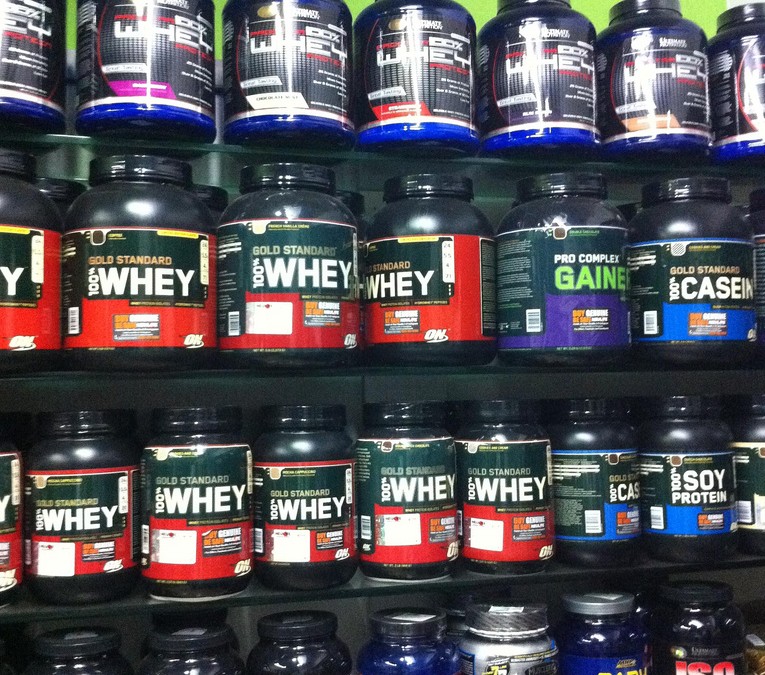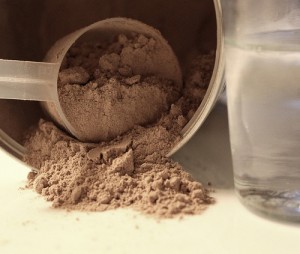Improve Your Lean Body Mass With Whey Protein
Overview.
- Whey is a fast-digesting, high-quality protein that helps promote tissue-building and repair.
- Lean mass is the portion of your body composition that is NOT fat including muscle, bones, internal organs, tendons, and ligaments.
- Increased lean mass can provide several advantages including higher expenditure of calories at rest and improved functionality in daily activities.
- Whey protein can be effective as a supplement with a proper resistance training and nutrition program for building lean mass.
- Research has indicated that to maximally stimulate muscle protein synthesis, 20-40 grams of whey protein is adequate in healthy younger and older individuals.
I remember my first protein shake.
One day after school, I noticed what appeared to be a chocolate milkshake on the kitchen counter.
So I did what any chubby, adolescent boy would do and gulped down the milkshake without a second thought.
But I stopped chugging when I realized it was NOT a chocolate milkshake.
The taste was repulsive and the consistency was grainy.
After some self-reflection of how problematic it is to inhale food and milkshakes without thought, I found the container for the powder mix and started reading the label.
The supplement label basically read everything a teenage male would want to hear except explicitly stating the supplement would get me laid.
So I continued supplementing with whey protein on and off throughout the beginning of high school until junior year.
By junior year of high school, I had become more involved in wrestling and was beginning to see positive changes to my body. That reinforced strength training, proper nutrition, and supplementation of whey protein.
After experimenting with several different protein powders, I finally found a brand with a decent taste and high quality.
Since discovering whey protein and seeing results in performance and lean body mass, whey protein has been a staple in all of my programs. Furthermore, I usually recommend whey protein to my clients with the permission of their physician.
The amount of lean mass I have attained as a result of resistance training programs and nutrition has been compounded with supplementation of whey protein.
What Is Lean Mass and Why is it Important?
Lean mass is the portion of your body composition that is NOT fat including muscle, bones, internal organs, tendons, and ligaments.
Increasing lean mass can be advantageous for the following reasons:
-Increased expenditure of calories at rest due to a higher metabolic rate;
-Increased muscularity/”toning”;
-Increased muscle strength;
-And improved functionality in daily life activities.
To improve lean mass, a combination of resistance training and proper nutrition is necessary. However, supplementation can be an effective aid for promoting lean body mass.
A supplement in particular that can help with improvements in lean mass development is whey protein.
Whey A Minute…Whey Protein?
Whey is a fast-digesting, high-quality protein that helps promote tissue-building and repair.
During the process of making cheese, the liquid portion of milk formed is whey protein.
Different types of whey protein are produced through processing, including concentrate, isolate, and hydrolysate. After processing, whey protein usually has a composition of high amounts of protein with low dietary fat.
Whey protein is considered a complete protein, usually containing high amounts of all nine essential amino acids. Essential amino acids are amino acids (“building blocks” of protein) that cannot be produced by the body and must be consumed through diet.
Whey protein can be effective as a supplement to a proper resistance training and nutrition program for building lean mass.
Whey More Lean Mass
A study conducted through the Journal of Applied Physiology, Nutrition, and Metabolism compared supplementation of 24 grams of whey protein to 24 grams of malodextrin (a common additive in sugary food items) in D-III female basketball players. The athletes performed a 4-day, 8-week resistance training program. Following the 8 weeks, the whey protein group gained about 3 pounds of lean mass and lost about 2.2 pounds of fat compared to the malodextrin group who only gained 0.4 kg (0.88 lbs) and did not lose fat (1).
Gaining 3 pounds of lean mass AND losing 2.2 pounds of fat in only 8 weeks is a significant improvement in body composition. Whey protein supplementation yielded significantly better lean mass during an 8-week resistance training program compared to supplementation of the sugary alternative.
In another study, whey protein was reported to DOUBLE the lean body mass and strength improvements when compared to carbohydrate consumption in young males with resistance training experience (2).
Both studies indicate that whey protein can amplify the results of a resistance training program, but how much whey protein should we consume?
How Much Whey Should You Consume for Lean Mass?
Research has indicated that to maximally stimulate muscle protein synthesis, 20-40 grams of whey protein is adequate in healthy younger and older individuals. Older participants may respond better to the higher end to maximize protein synthesis (3).
Muscle growth is supported by intake of 20-40 grams of whey protein, but how much exactly is 20-40 grams of whey protein? One serving of a high-quality whey protein powder – usually measured in a scoop – typically has around 20 grams of protein per serving. While serving sizes may vary, a scoop may be around one-thirds of a cup.
Whey Protein Powder Brand Recommendations
One whey protein product that I have used throughout years of competitive sports and weightlifting programs is Optimum Nutrition Gold Standard Whey.
Throughout high school football, wrestling, Mixed Martial Arts (MMA), and competitive powerlifting, I have used Optimum Nutrition Gold Standard Whey along with a few of their other supplements.
There are a wide array of different flavors to choose from and the powder has good solubility (it mixes well).
Always consult with a physician prior to starting any supplementation.
References:
1. Taylor LW, Wilborn C, Roberts MD, White A, Dugan K. Eight weeks of pre- and postexercise whey protein supplementation increases lean body mass and improves performance in Division III collegiate female basketball players. Appl Physiol Nutr Metab. 2015 Nov 9:1-6.
2. Burke DG, Chilibeck PD, Davidson KS, Candow DG, Farthing J, and Smith-Palmer T. The effect of whey protein supplementation with and without creatine monohydrate combined with resistance training on lean tissue mass and muscle strength. Int J Sport Nutr Exerc Metab 11: 349-364, 2001.
3. Hayes A and Cribb PJ. Effect of whey protein isolate on strength, body composition and muscle hypertrophy during resistance training. Curr Opin Clin Nutr Metab Care 11: 40-44, 2008.





